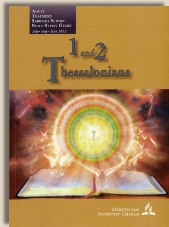|
||||||||||||||
Commentary on "Preserving Relationships"
Day 4: Tuesday, July 10, 2012 - Interlude in Athens
Overview
In today’s lesson Paulien makes the point that when Paul was in Athens, he spent some time learning the local culture before addressing the local intellectuals. He stresses that Paul began his address with the subject of creation and then, instead of arguing his case from Scripture as he did in the synagogue, he argued his case from their own writings.
The lesson ends with questions about why it is important for us to understand the worldviews and religions of those around us as we seek to witness.
Observations
Again, Paulien creates a scenario that is different from the actual narrative in Acts 17. It’s worth noting, again, that this lesson has nothing to do with the books of 1 and 2 Thessalonians but instead is continuing to examine Paul’s visits to different cities as described in Acts. These examinations are for the purpose of making the author’s point about Paul’s relationships which cemented the new believers in the church.
In fact, the passage in Acts 17 that describes Paul’s visit to Athen is as follows:
So Paul, standing in the midst of the Areopagus, said: “Men of Athens, I perceive that in every way you are very religious. For as I passed along and observed the objects of your worship, I found also an altar with this inscription, ‘To the unknown god.’ What therefore you worship as unknown, this I proclaim to you. The God who made the world and everything in it, being Lord of heaven and earth, does not live in temples made by man, nor is he served by human hands, as though he needed anything, since he himself gives to all mankind life and breath and everything. And he made from one man every nation of mankind to live on all the face of the earth, having determined allotted periods and the boundaries of their dwelling place, that they should seek God, and perhaps feel their way toward him and find him. Yet he is actually not far from each one of us, for
“‘In him we live and move and have our being’; as even some of your own poets have said,‘For we are indeed his offspring.’
Being then God's offspring, we ought not to think that the divine being is like gold or silver or stone, an image formed by the art and imagination of man. The times of ignorance God overlooked, but now he commands all people everywhere to repent, because he has fixed a day on which he will judge the world in righteousness by a man whom he has appointed; and of this he has given assurance to all by raising him from the dead.”
Now when they heard of the resurrection of the dead, some mocked. But others said, “We will hear you again about this.” So Paul went out from their midst. But some men joined him and believed, among whom also were Dionysius the Areopagite and a woman named Damaris and others with them (Acts 17:22-34).
Paulien creates the scene of Paul walking around Athens and observing the culture. Paulien admits Paul did do some teaching in the synagogue and that he reasoned with anyone willing to talk to him as he wandered around Mars Hill and the marketplace.
Interestingly when Paulien comments on Paul’s sermon on Mars Hill, he refers indirectly to verses 27 and 28 and makes the point that he didn’t argue his case from Scripture but from their own writings. He acknowledges that when he went beyond the philosophers’ comfort zone, they seemed to abruptly end the conversation.
What Paul Did
Paul didn’t overtly refer to Scripture in this sermon on Mars Hill, but he preached specific scriptural truths. His sermon was not based essentially on the Greek writers, as Paulien suggests, but Paul taught uniquely scriptural facts which even Paulien and Adventism in general would not likely embrace.
Specifically Paul told the Athenians that God had created all men and needed nothing from them—a teaching that opposed all pagan religions. Further he taught that God gave all life and breath to all men. Even more specific and astounding was Paul’s next point that God created all nations out of one man—and the He determined every time and every place where each nation would exist.
In other words, Paul was stating that the very existence and duration of every nation ever to exist on earth was determined by God. Nations did not exist because of man’s ambition or political brilliance; they exist because God ordained and planned not only that they would exist but also when and where. This creation and planned existence, Paul continues, was for the purpose of causing all men to desire to know God.
Then Paul quotes a Greek author to emphasize his point that all men everywhere exist and live in God and are His offspring. Paul then uses that quote to demonstrate that created idols cannot be true gods, because if men exist in God and are His offspring, then idols cannot be gods because they are formed by man. In other words, the children who depend on God cannot form God. It has to be the other way around.
Paul then called those Athenians to repentance and declared another dogmatic statement which Adventists do not understand or believe: that a day of judgment is coming, and that day is already fixed and determined.
Adventists believe that the day of judgment depends on the success and participation of humans who either hasten the day with their loyalty, Sabbath keeping, and evangelism, or they delay the day by their laxness and disobedience.
Moreover, Paul makes the point that God has determined that this day of judgment will be administered by One who has risen from the dead.
Paul is not skirting the issue; he is proclaiming the gospel. For Paulien to suggest that Paul’s first agenda was to study the culture and then engage the intellectuals is giving a false impression of the biblical account. To be sure Paul was astute and used a quote and an inscription from Athens to get their attention and to illustrate his point, but he was clear and outspoken with the pure gospel. He taught the Lord Jesus to those pagans, and he was unashamed.
We are called to trust God, not to devise cleverly delivered sermons based on the local culture. Paul did not modify his gospel presentations and his clear calls to repentance when he discoursed to the Greek intellectuals. On the contrary, as he explains in 2 Corinthians 2, human wisdom is foolishness next to God’s wisdom.
Paul preached an offensive message to the Athenians, and he didn’t water it down. He did not go into Athens and attempt to create relationships and gradually ease into sharing what he had in common with them and then gently work the gospel into their worldview.
This method is standard procedure among Adventists when they work with Muslims, and Paulien is attempting to create the impression that Paul functioned this way. But he did not. He spoke clearly, and he did not try to identify with the Athenians as sharing common values. He used their writings as a way to illustrate his points, but he did not use them to soften the message that the Athenians were sinners and needed to repent, that they needed to honor the one true God who created them all, and that they needed to know the One who was risen from the dead.
Summary
- Paul did not go into Athens and spend time learning the culture before preaching to the citizens.
- Paul preached clear biblical truths that even Adventists cannot fully embrace: God created from one man every nation on earth and determined the times and places each one would be.
- Paul used the Athenians’ writings to illustrate the gospel points he made, not to try to make connections with the people so as to ease his teachings into their conversations.
- We do not have to worry about the culture. We are to depend on the Lord Jesus and speak the truth He has given us in Scripture.
Copyright 2012 BibleStudiesForAdventists.com. All rights reserved. Revised July 9, 2012. This website is published by Life Assurance Ministries, Camp Verde, Arizona, USA, the publisher of Proclamation! Magazine. Contact email: BibleStudiesForAdventists@gmail.com.
The Sabbath School Bible Study Guide and the corresponding E.G. White Notes are published by Pacific Press Publishing Association, which is owned and operated by the Seventh-day Adventist church. The current quarter's editions are pictured above.
Official Adventist Resources
Standard Edition Study Guide Week 2
Teacher's Edition Study Guide Week 2
Easy Reading Edition Study Guide Wk 2
Search the Complete Published Ellen G. White Writings
Please Support This Project


